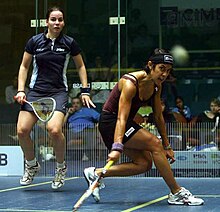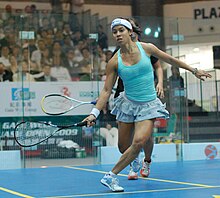|
|
Squash is a racquet sport played by two or four players in a four-walled court with a small, hollow rubber ball.
Tuesday, 25 June 2013
Scoring of squash
International (Traditional)
- A point is scored only when the server wins a rally.
- When the server loses a rally he or she loses the right to serve and the opponent becomes the server.
- When a point has been scored durng play, the server must serve from the opposite service box.
- The first player to nine points wins a game.
- A match usually consists of the best of five games; that is, the first player to win three games wins the match.
- If, in any game, the score reaches eight-all, then the player who reaches 8 first, decides whether that game is to be played to nine (Set 1) or ten points (Set 2).
- The first player to reach the chosen number of points wins the game.
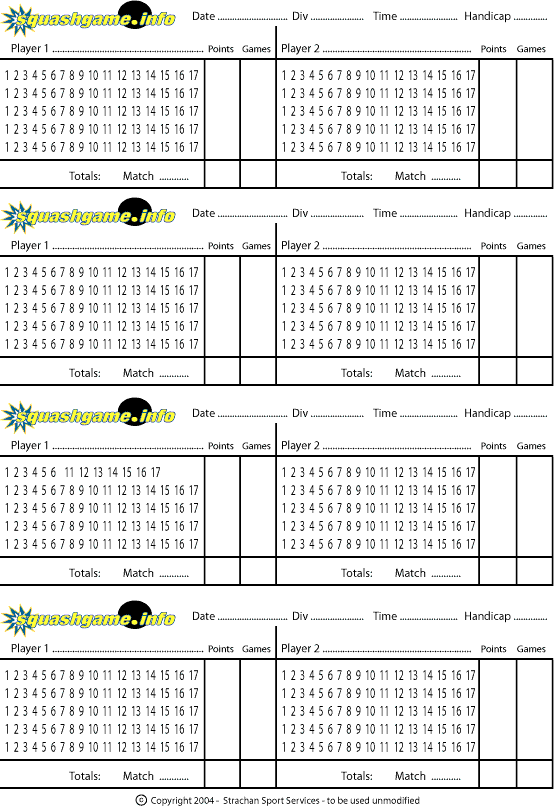
Point-a-Rally(PARS)
- A point is scored for each rally won.
- Usually matches are played to the best of 5 games with each game being played to 15 points.
- In the event of the scores being 14 all, the first player to 14 can select whether the game will be played to 15 (Set 1) or 17 points (Set 3)
- This method of scoring usually results in shorter playing time for a match.
Other options
- Play a time limit game of between 25 to 45 minutes with two or three breaks of 1 minute duration.
- PARS is very flexible - players can create their own game play format.
How to record the score?
The procedure for marking a game:
- The Marker calls the Score.
- The Score Sheet is divided into two sides, one side for each player.
- Each side has an "L" and "R" marked in a box, which stands for Left and Right Service Box.
- As the Server serves from the Right Box, the Scorer's pencil points to Box "R". The pencil stays in the box until the point is won or lost. The Server's score is always called first, eg 5:3 Smith serving or 3.5 Brown if Brown had won the point and was to serve.
- The pencil would point to the appropriate service box.
1. Traditional Method - The Server can only score points, and the first to 9 points wins.
2. PARS (Point a Rally) - The winner of the rally wins the point, first to 11 points wins.
Basic Squash Skills
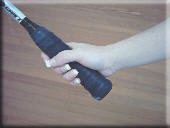
- Hold the grip firmly at all times during the swing. Keep a firm wrist during the swing.
- Approach the ball from one side (usually from the side closest to the centre of the court). Right handed Squash players should try to play "forehands" on the right hand side of the court and play "backhands" on the left hand side of the court. (Reversed for left handers).
- Read more about Basic Squash Skills in Strokes & Movement
Basic Squash Tactics
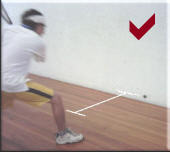
- Hit the ball away from your opponent, making them run.
- Hit backhand shots on the backhand side of the court and forehands on the forehand side.
- Hit the ball to the corners and close to the side walls.
- Volley during play whenever possible. Return to the centre of the court quickly each time you make a return whilst watching the ball.
- More information on Tactics
- Read about playing lefthanded players Squash Players.
Basic Squash Rules
- Once the ball has been struck, it is the responsibility of the striker to clear the way for the opponent to make a return.
- If there is interference in the opponent reaching the ball, the players should play the point again (this is called playing a LET).
- If your opponent is in the way of you making a return or is in danger of being hit in the process, a “LET” should be played.
- Both the striker and the opponent should make every effort to clear the ball or to get to it if a “LET” is to be played.
- If the player hits the ball back to themselves and hits them or goes very close to them, a “STROKE” is awarded to the opponent, winning the rally for them.
- More information on the Rules
Squash Balls
- There are a range of balls available for all standards.
- The court temperature also plays a big part in Squash ball selection (In colder temperatures, you may need to use a bouncier ball).
- The following Squash balls should be available in your area:
- Super Slow
- Yellow Dot - Slow
- White or Green Dot - Medium
- Red Dot - Fast
- Blue Dot - Fast
- There is also an Extra Super Slow Double Yellow Dot ball used by professionals or by accomplished players in hotter countries.
- A blue beginners ball may also be available.
Modified Equipment
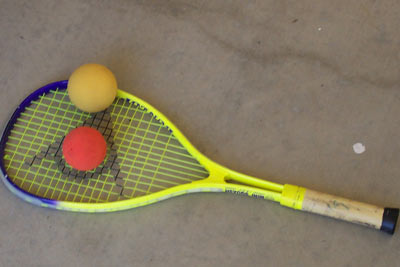
- Because squash is a very fast game and requires quick co-ordinated reflexes the use of modified equipment (a shorter racket and larger ball) can help novices gain confidence, and have more enjoyment.
- Racket Ball and Mini Squash are games played on a squash court that might suit some players who are having difficulty managing the full size equipment.
- More on Modified Games
A Begginer Guide- How to play squash?
A beginner's guide on playing squash, the tactics, the technique , the rules and how to play squash safely
Squash Safety and Fitness.
About the squash serve.
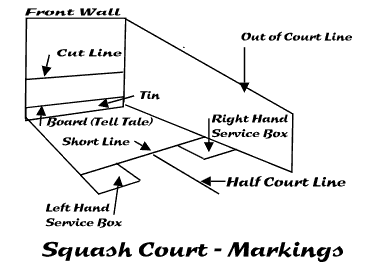
Video resources for:
- Forehand return of serve
- Banckhand return of serve
- Squash is played between two individuals (singles) or two teams of two (doubles) on a Squash Court.
- One player serves to start a rally which proceeds until one player hits the ball out or down or fails to hit the ball before it has bounced twice.
- Squash can be played using a couple of scoring options, traditional (International) scoring and point a rally scoring (PARS).
- Squash Players having a social game can modify the rules to their own requirements.
Squash Safety and Fitness.
- If your fitness is poor or you haven’t played Squash for some time, don’t overdo it.
- Remember, Squash is a fast game. If you have a rally which requires a lot of short sharp movement, it may take your body a moment or two before it realises that a lot of oxygen is needed for recovery.
- This can result in a sudden increase in heart rate.
- This is not a good thing for those who lack fitness.
About the squash serve.
- The server, with at least one foot in the service box, starts play by hitting the ball directly onto the front wall between the cut line and the outline to rebound so that, if allowed, it bounces for the first time in the opposite half of the court and behind the short line.
- See Squash Court Markings.
- It may hit another wall after hitting the front wall, providing the ball lands within the correct half court.
- The receiver may hit the ball on the full. If the server wins the rally they serve from the alternate service box.
- If the receiver wins the rally they choose which box to start serving from.
- More on the Squash Serve
Return of serve.
While waiting to return the serve, watch the server to get an idea of:
-Keep out of the back corner.
-Keep away from the walls.
Rally between two players.
- The type of Serve to expect.
- The angle of the serve.
- The speed of the serve
-Keep out of the back corner.
-Keep away from the walls.
Rally between two players.
- The 2(or 4 for doubles) Squash players, each with a racket, take it in turns (for doubles, each team takes turns) to hit the ball onto the front wall within the large area defined by the outline at the top and the line marking the top of the tin at the bottom (the striker may play the ball onto the side or back walls first before it hits the front wall).
- The ball must stay within the court. The ball must be hit on the first bounce or volleyed.
- Play continues until the ball goes out or down or is hit after the first bounce.

Video resources for:
- Forehand return of serve
- Banckhand return of serve
Tuesday, 18 June 2013
Ong Beng Hee
Ong Beng Hee (born 4 February 1980, in Penang, Malaysia) is a professional squash player from Malaysia.
With four successive Asian Championship titles from 2000–2006; gold medals in both the 2002 and 2006 Asian Games, 11 PSA Tour titles from 19 final appearances, and a career-best world ranking of No 7, Ong Beng Hee has become Malaysia’s most successful men squash player of all-time. In August 1998, the Penang teenager crowned a glittering junior career in the USA by becoming the World Junior Champion – an achievement that made him the first non-Pakistani Asian to claim the most prestigious junior title.
He began the new millennium outside the top 40. By the end of the year he had won his first Asian Championship; had become the first Malaysian to qualify for the British Open, then went on to make the quarter-finals. He had also secured three PSA titles. The third of these was in Kuala Lumpur where he became the first home winner of the prestigious Malaysian Open. His sparkling year was rewarded by a leap into the top ten, and a career-best world number 7 ranking in December 2001.[1][2]
With four successive Asian Championship titles from 2000–2006; gold medals in both the 2002 and 2006 Asian Games, 11 PSA Tour titles from 19 final appearances, and a career-best world ranking of No 7, Ong Beng Hee has become Malaysia’s most successful men squash player of all-time. In August 1998, the Penang teenager crowned a glittering junior career in the USA by becoming the World Junior Champion – an achievement that made him the first non-Pakistani Asian to claim the most prestigious junior title.
He began the new millennium outside the top 40. By the end of the year he had won his first Asian Championship; had become the first Malaysian to qualify for the British Open, then went on to make the quarter-finals. He had also secured three PSA titles. The third of these was in Kuala Lumpur where he became the first home winner of the prestigious Malaysian Open. His sparkling year was rewarded by a leap into the top ten, and a career-best world number 7 ranking in December 2001.[1][2]
Biography
1994 - 1997
Ong Beng Hee began playing squash when he was eight – at the 17-court club his squash-enthusiast father had built in Malaysia. He first came to international attention in January 1994 when he won the prestigious British Junior Under-14 Open title in England. A year later he reached the final of the Under-16 British Open, going one better in January 1996 by winning the Under-16 title. Later that year, he showed his promise by reaching the semi-finals of the 1996 World Junior Open in Egypt, competing as a 16-year-old in an event in which most fellow competitors were at least two years older.Coached initially by his father, then the Canadian Malaysian national coach Jamie Hickox, Beng Hee moved to England in 1997 to work with Neil Harvey, coach to England's long-time world No 1 Peter Nicol - later moving north to work with Malcolm Willstrop.[citation needed]1998 - 2001
In January 1998, he became the British Junior Under-19 Open champion, at the age of 17, and joined a select and distinguished group of squash players who have claimed three British Junior Open titles. In August, Beng Hee clinched the World Junior Open title in his second successive final, beating Egypt’s Wael El Hindi in the final in Princeton, New Jersey, USA. In 2001, Beng Hee reached the quarter-finals of five Super Series events - an achievement which was rewarded the following year by his debut in the Super Series Finals in London.[citation needed]2003 - 2007
In 2003, Beng Hee made up for the disappointment of a third round exit in the men’s singles of the Commonwealth Games in England by winning the silver medal in the Mixed Doubles with illustrious compatriot Nicol David. 2007 highlights include beating higher-ranked Stewart Boswell to reach the quarter-finals of the British Open in Manchester - then, later in the year, repeating his success over the Australian in the Qatar Classic before achieving a second upset over Egyptian Wael El Hindi to become the only unseeded player to reach the last eight of the Super Series event in Doha.[citation needed]Recent years
Beng Hee consolidated his presence in the middle of the top 20 in 2008 with an appearance in the final of the Kolkata International in India in February. But the biggest boost to his confidence came in his home country in March when he reached the final of the KL Open for the third time - but this time beat his new national rival Mohd Azlan Iskandar 11–8, 15–13, 12–10 to win the title for the first time, while also avenging the defeat by his compatriot in the 2006 final. The win also endorsed his rise above Iskandar in the PSA rankings - but later took Beng Hee back into the world top ten for the first time since December 2003.[citation needed]The profile of Low Wee Wern
| Low Wee Wern | |||||||||||||
|---|---|---|---|---|---|---|---|---|---|---|---|---|---|
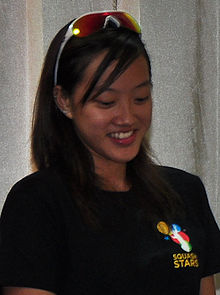 Low Wee Wern during the Squash Stars Meet the Stars session in 2010. |
|||||||||||||
| Full name | Low Wee Wern | ||||||||||||
| Nickname(s) | Werny [1] | ||||||||||||
| Country | |||||||||||||
| Residence | Georgetown, Penang | ||||||||||||
| Born | July 25, 1990 (age 22) Georgetown, Penang |
||||||||||||
| Turned Pro | 2006 | ||||||||||||
| Retired | Active | ||||||||||||
| Plays | Right Handed | ||||||||||||
| Coached by | Aaron Soyza | ||||||||||||
| Racquet used | Technifibre | ||||||||||||
| Women's singles | |||||||||||||
| Highest ranking | No. 6 (March, 2013) | ||||||||||||
| Current ranking | No. 6 (March, 2013) | ||||||||||||
| Title(s) | 6 | ||||||||||||
| Tour final(s) | 14 | ||||||||||||
| World Open | QF (2010) | ||||||||||||
|
Medal record[hide]
|
|||||||||||||
| Last updated on: March, 2013. | |||||||||||||
Nicol Ann David- Squash Carrer
Pre–2000: Junior years
David played squash when she was five years old, and received coaching at the age of eight.[1] While training at the Bukit Dumbar Squash Centre, David was talent spotted by Ee Phoeh Hoon,[22] who led her to represent her home state of Penang, along with her sisters.[10] David's squash career began in 1992 when she won silver in the Under-14 category of the Penang State Junior Championship.[23] Her first national level victory was also in 1992 at the Milo-Dunlop Sport National Junior Interstate Championship, where she won silver in the Under-16 category.[23] In 1994, David was chosen to join the Penang state squash team for the Malaysian Games (SUKMA) tournament where she helped Penang win a gold medal in the team event, despite being ill at the time.[6] In the same year, she won her first two international titles – the Hong Kong U-13 and the Scottish Junior Open Under-12.[23]David won the Women's World Junior Squash Championships of 1999 in Antwerp, Belgium, making her the youngest woman to become the world junior champion at the age of 15.[24] In the process, she defeated three players ranked in the world top 20.[24] She successfully defended the title in Penang in 2001, becoming one of only two players in the history of squash to have won it twice;[25][26] her coach was Richard Glanfield.[27]
In 1999, David began to win major junior tournaments, including the British Junior Open (Under-17 champion),[28] the German Junior Open (Under-19, Champion),[6] the SEA Games (Champion in the Senior and Team categories),[6] and the Asian Junior Champion for both individual and team events.[29]
David's biggest win, however, was the World Junior Championships, played in Antwerp. It took just half an hour for the then 15-year-old Malaysian schoolgirl to obtain world junior champion status when she beat compatriot Leong Siu Lynn 9–5, 9–3 and 9–2 in the final of the women's individual event to become the youngest ever winner of the title.[6][24] David reached the quarterfinals of the previous World Junior Championships in August 1997 in Brazil, as a thirteen-year-old and has since claimed both the Asian junior and senior titles, as well as the gold medal in the Asian Games in December 1998.[24] David also is one of a few squash player to have won all the age categories in the British Junior Open.[28]
2000–2004: Early professional career
Nicol David and New Zealander Shelley Kitchen during the 2007 CIMB Malaysian Open.
In 2001, David, who has played under Dunlop Sport sponsorship for most of her junior career and WISPA career, signed a two-year deal to play with Head rackets with local conglomerate Mulpha Sports.[32] In July, David won the World Junior title for a second time, beating Omneya Abdel Kawy in just 17 minutes with a score of 9–2, 9–4 and 9–2 in the final.[26] She remained the only female squash player to have achieved this until 2007, when Raneem El Weleily won her second World Junior Championship.[25][33] David also won the individual event in the Asian Junior Squash Championships by defeating her compatriot Tricia Chuah in the final with a score of 9–5, 9–6 and 9–0; and helped the Malaysian team to the team event title.[34]
In 2002 David, together with her mixed double event partner Ong Beng Hee, won a Commonwealth Games silver medal for Malaysia after losing to Glen Wilson and Leilani Rorani in the final.[35] Earlier in the year, David defeated Ellen Petersen of Denmark with a score of 9–2, 9–7, 8–10, 9–4 to win the second Kuala Lumpur Open title of her career.[36] David failed to retain her Asian Games gold medal in 2002, when she lost 9–7, 9–5 and 9–7 to Rebecca Chiu of Hong Kong in the final in Busan, South Korea.[37]
David was the losing finalist twice in 2003, losing to the more experienced Cassie Jackman on her home ground and then to Linda Elriani in the Monte Carlo Classic in November.[38] She reached the semi-final of the World Open in Hong Kong, losing to Cassie Jackman with a score of 9–6, 9–3, 9–4 in the final.[39] David did not perform well in the other major WISPA events; she was eliminated in the first round of the Carol Weymuller US Open,[40] in the British Open[41] and in the Texas Open.[42] In the Qatar Classic Open, David lost in the second round to Natalie Grinham with a score of 9–2, 7–9, 9–0 and 9–4.[43]
In 2004 David again failed to win any title. Her achievements included getting into the final of both the Kuala Lumpur Open[44] and the Malaysian Open.[45] David started to progress in the very last month of the year by reaching the final of the Shanghai WISPA WorldStars Championship[46] and the semi-finals of the World Open,[47] to rise two places to number four in the January 2005 WISPA rankings.[48]
2005–2006: World champion and rise to the top
Defeated only twice in 2005, the 21-year-old from Penang returned to her home country in July after winning the gold medal at the World Open in Germany to become the youngest squash world champion.[49] She then became the first local player to win the Women's CIMB Malaysian Open Squash Championship title in the event’s 31-year history.[50] In October, David proved that her success in the World Open and in the Malaysian Open was not by chance by becoming the first Malaysian to win a British Open title, the first Asian to win the women's crown, when she beat Australia's Natalie Grinham in the women's final in straight games that lasted in 55 minutes.[51] Within two months after the British Open and the World Open win, David won the following year's world number one ranking for the first time. Later in the year, she was voted by her fellow members of the Women's International Squash Players Association as the WISPA Player of The Year 2005.[52]David became the World's number 1 female squash player in January 2006 at the age of 23 to become the first Malaysian and the first Asian woman to be ranked World number 1 in the sport.[53][54] She also became the twelfth holder of the position since the rankings were first produced in April 1983.[54] David started the year on a low, losing twice to Vanessa Atkinson in February, in the Apawamis Open[55] and in the Kuala Lumpur Open,[56] both in the final. The two straight loses to Atkinson saw David's world rank dropped to number 2.[57] David started to show progress later in the year and recovered from the setback to win six straight tour titles and reclaimed the World number 1 spot.[58] David successfully defended her World Open title on 25 November 2006, at the Ulster Hall in Belfast by defeating Natalie Grinham in the final that was said to be "one of the great finals of the Women’s World Open".[59] She became the first Malaysian athlete to win a world championship title for the second consecutive time, and the fourth person in history to retain the World Open Squash Championship.[60] David also captured the Qatar Airways Challenge Open,[61] the Dunlop British Open Championship,[62] the Hong Kong Open,[63] the Penang Open[64] and the CIMB Malaysian Open.[65] David topped the December WISPA ranking with a points average of almost twice that of her nearest rival, Rachael Grinham,[66] and in the same month, in the second annual WISPA Awards, she was voted best female player of the year for the second time.[67]
2007–2008: Winning streak and dominance
Nicol returning the ball to Jenny Duncalf at the 2007 CIMB Open at National Squash Complex, Bukit Jalil, Selangor.
In 2008, David won ten tour titles and was unbeaten.[72] David completed her most successful year to date, retaining her Cathay Pacific Hong Kong Open title[73] for the third successive year in November to bring her 2008 WISPA World Tour title total to ten, extending her unbeaten Tour record since October 2007 to 53 matches.[73][74] David celebrated her second full calendar year as world number one in the December Women's World Squash Rankings thus bringing her reign at the top of women’s squash to 30 straight months.[75] David's WISPA title successes in 2008 began with the Apawamis Open in New York in February,[76] and continued with the KL Open on home soil in Malaysia,[77] the British Open title in England,[78] Seoul Open in Korea,[79] Malaysian Open,[80] the Singapore Masters,[81] Dutch Open,[82] World Open in England,[83] Qatar Classic[84] and the Hong Kong Open.[73] Away from the tour, David secured her sixth successive biennial Asian Championship crown in February, after winning the first in July 1998 when aged just 14,[85] and then lead Malaysia to the bronze medal in the Women's World Team Championship in Cairo.[86]
2009–present: Achieving records
Nicol Ann David in action on the sixth day of the 2009 Hong Kong Open.
Twenty-one days after winning the Texas Open title, David captured her second Seoul City Open crown by defeating Jenny Duncalf in four sets.[90] A month later, on 24 July, she retained her World Games women's singles title with a win over arch rival Natalie Grinham of the Netherlands in straight sets.[91][92] A week later, on 1 August, David picked up her fifth consecutive Malaysian Open title, winning 11–6, 11–8, 9–11, 11–7 in a 60-minute match against 25 year-old Londoner, Alison Waters. David thus became the first player to win five Malaysian Open titles in a row since its inception in 1975.[93]
Dominating on the squash courts, David beat Natalie Grinham to win her third consecutive Singapore Masters championship, and her third title within a month.[94] She overcame Natalie in three sets with a score of 11–9, 11–8 and 11–9 for her fifth WISPA title of the year.[94] David celebrated another milestone in her squash career by moving into her 41st month as world number one in the September Women's World Rankings thus surpassing her mentor Sarah Fitz-Gerald as the player with the third longest ever reign at the top of the women's rankings.[95] On 12 September, David lost to Madeline Perry in the British Open quarter-final in a five set match that lasted for 76 minutes; 15 days later, she recovered to defeat arch-rival Natalie Grinham in the final of the World Open Championship, obtaining the title for a record fourth time.[96] David ended the year on a low when she lost in the semis to Jenny Duncalf in both the Qatar Classic and the US Open, the former ending in five sets.[97]
David started 2010 ranked number 1 for the 42nd consecutive month.[98] She appeared in the WISPA calendar for the month of January.[99] David competed in her first tournament in March, the US$53,000 Chennai Open;[100] she won all her matches in straight sets and was crowned as the champion, avenging two straight defeats to Jenny Duncalf in late 2009.[101] Thirteen days later, in the Kuala Lumpur Open, David defeated the fourth seeded Egyptian Omneya Abdel Kawy who upset second seed Jenny Duncalf in the semi-finals in straight sets to win her second successive WISPA title of the year.[102] It was David's sixth title in the Kuala Lumpur Open tournament as she had previously won it in 2000, 2002, 2005, 2007 and 2008.[103]
David had won five more tour titles since April. This include winning the "prestigious"[104][105][106] World Open title on 22 September.[107] The World Open win was David fifth thus equalling Sarah Fitz-Gerald's record for the most times World Open win.[108] In October, in the women's singles final of the 2010 Commonwealth Games in Delhi, David defeated Jenny Duncalf 11–3, 11–5, 11–7 in 40 minutes to win the gold medal. David did not drop a game in the entire tournament, just as she did in the 2010 World Open in Egypt.[109]
Rivalry between David and Natalie Grinham
Main article: Nicol–Natalie Grinham rivalry
David and Natalie Grinham
have a long rivalry history. As of March 2012, they have met 32 times,
with David leading their overall head-to-head series 25–7.[110][111] Grinham is David's most frequent opponent on tour[111] and 16 of their matches have been in tournament finals, including two in the World Open tournament.[110] The World Open 2006 final between David and Grinham was said to be "one of the great finals of the Women’s World Open".[59]The longest match between the duo is in the 2007 CIMB Kuala Lumpur Open; which saw David went on to win in a five set match that lasted in 102 minutes. David won 6–9, 9–3, 9–6, 7–9, 9–6.[112] On 27 September 2009 in the $118,000[113] 2009 Women's World Open final,[96] David won the match in four sets 3–11, 11–6, 11–3, 11–8 to become only the third player in the history of the championships to win four titles, alongside Australia's Sarah Fitz-Gerald and New Zealander Susan Devoy.[113]
Nicol Ann David
Datuk Nicol Ann David (born 26 August 1983) is a Malaysian female professional squash player. She is currently ranked world number 1 in women's squash, and is the first Asian woman to achieve this. She won the British Open title in 2005, 2006, 2008, and 2012, as well as the World Open title a record 7 times in 2005, 2006, 2008, 2009, 2010, 2011 and 2012.
David is the first squash player to have won the World Junior title twice; in 1999 and 2001 under the tutelage of Richard Glanfield. She remained the only female squash player to have achieved this, until Raneem El Weleily emulated David's feat by winning her second World Junior Championship in 2007. David joined WISPA and turned professional in 2000 when she won her first WISPA title, after only a month in the tour. The victory came in February, when she defeated Salma Shabana in the final of the Savcor Finnish Open. On 7 June 2008, David was honoured with the Order of Merit (Darjah Bakti) or D.B. in conjunction with the birthday of the His Majesty Tuanku Mizan Zainal Abidin. She was the first recipient of the award which was established on 26 June 1975. David was also invited to carry the Olympic torch for Malaysia during the build up to the Athens Olympics in 2004 and being appointed as UNDP National Goodwill Ambassador for Malaysia.
David's other notable achievements include the Asian Squash Championship, which she won a record eight times (in 1998, 2000, 2002, 2004, 2006, 2008, 2010 and 2011). She also held a 13-month, 51-match winning streak, from March 2006 until April 2007, when she finally lost to Natalie Grinham in the final of the 2007 Seoul Open. David has also obtained the WISPA Player of the Year on seven occasions, from 2005 until 2010 and 2012.
On 12 July 2008, David was among 497 people honoured in conjunction with the 70th birthday of the Penang State Governor Tun Abdul Rahman Abbas.[15] David was also one of the 28 people who received the Darjah Setia Pangkuan Negeri award (DSPN),[16] which carries the title Datuk, making her the youngest person ever to be conferred Datukship in Penang.[15] The former Prime Minister of Malaysia Tun Abdullah Ahmad Badawi, a fellow Penangite,[17] once quipped that David is "now more famous than me".[7] In July 2007, David received Master of Arts honoris causa; an honorary degree by the University of Nottingham.[11] David has also obtained the WISPA Player of the Year on six consecutive occasions, from 2005 until 2010.[18]
David was given the honour of carrying the Olympic torch for Malaysia during the build up to the Athens Olympics of 2004,[19][20] and was appointed UNDP National Goodwill Ambassador for Malaysia.[21]
David is the first squash player to have won the World Junior title twice; in 1999 and 2001 under the tutelage of Richard Glanfield. She remained the only female squash player to have achieved this, until Raneem El Weleily emulated David's feat by winning her second World Junior Championship in 2007. David joined WISPA and turned professional in 2000 when she won her first WISPA title, after only a month in the tour. The victory came in February, when she defeated Salma Shabana in the final of the Savcor Finnish Open. On 7 June 2008, David was honoured with the Order of Merit (Darjah Bakti) or D.B. in conjunction with the birthday of the His Majesty Tuanku Mizan Zainal Abidin. She was the first recipient of the award which was established on 26 June 1975. David was also invited to carry the Olympic torch for Malaysia during the build up to the Athens Olympics in 2004 and being appointed as UNDP National Goodwill Ambassador for Malaysia.
David's other notable achievements include the Asian Squash Championship, which she won a record eight times (in 1998, 2000, 2002, 2004, 2006, 2008, 2010 and 2011). She also held a 13-month, 51-match winning streak, from March 2006 until April 2007, when she finally lost to Natalie Grinham in the final of the 2007 Seoul Open. David has also obtained the WISPA Player of the Year on seven occasions, from 2005 until 2010 and 2012.
Personal life
Born in Penang,[4] David is the daughter of Ann Marie David, a retired Malaysian Chinese school teacher, and Desmond David, a Malaysian Indian[5] engineer,[6] who is also a former state athlete and footballer.[7][8] She has two sisters, Lianne and Cheryl,[9] both of whom are accomplished squash players at the national level.[10] As a youngster, mathematics was David's best subject at school;[1] she dreamed of one day becoming an engineer.[1] Her primary education was at Sekolah Kebangsaan Convent Green Lane (Convent Green Lane Primary School). David scored seven A's for her Penilaian Menengah Rendah and obtained seven A's in her Sijil Pelajaran Malaysia (the equivalent to GCSE), which she studied at Convent Green Lane Secondary School in Green Lane, Penang.[11][12] She was raised a Roman Catholic.[citation needed]Awards and recognition
On 7 June 2008, David was honoured with the Order of Merit (Darjah Bakti) or D.B.[13] in conjunction with the birthday of His Majesty Tuanku Mizan Zainal Abidin.[14] She was the first recipient of the award which was established on 26 June 1975.[14] The award is limited to 10 recipients who have made significant contributions in the arts, sciences and the humanities.[13][14]On 12 July 2008, David was among 497 people honoured in conjunction with the 70th birthday of the Penang State Governor Tun Abdul Rahman Abbas.[15] David was also one of the 28 people who received the Darjah Setia Pangkuan Negeri award (DSPN),[16] which carries the title Datuk, making her the youngest person ever to be conferred Datukship in Penang.[15] The former Prime Minister of Malaysia Tun Abdullah Ahmad Badawi, a fellow Penangite,[17] once quipped that David is "now more famous than me".[7] In July 2007, David received Master of Arts honoris causa; an honorary degree by the University of Nottingham.[11] David has also obtained the WISPA Player of the Year on six consecutive occasions, from 2005 until 2010.[18]
David was given the honour of carrying the Olympic torch for Malaysia during the build up to the Athens Olympics of 2004,[19][20] and was appointed UNDP National Goodwill Ambassador for Malaysia.[21]
Subscribe to:
Posts (Atom)



